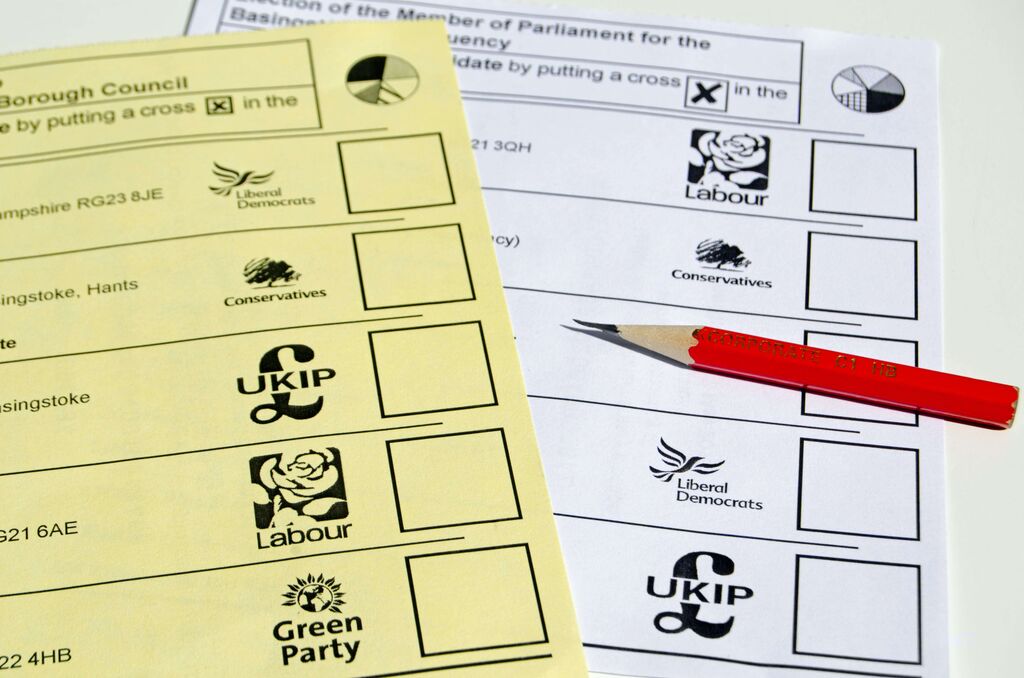A Conservative wipeout? How to process results on election day as a Christian.

It’s Results Day. After much talk about an impending Conservative wipeout in the Locals, shady rumours about a potential challenge to the Prime Minister from the backbenches, and a number of bitter Mayoral campaigns, particularly in London, the verdict is now in (or largely, at least…as I write this, around 80% of the Councils have declared their results, and we have a fairly good grasp on how things have turned out).
Local elections - and these ones only took place in England and Wales, rather than across the whole UK - never tend to get people as excited as General elections: in the last local elections in England, in 2021, the turnout was 36%; whereas for the last General election, in 2019, it was 67%. And in a sense, I understand that; in Local Elections we’re not voting on who the next Government is going to be.
But they do still matter.
Why do local elections matter?
Local Elections matter to God: Paul tells us in 1 Timothy 2: “I urge, then, first of all, that petitions, prayers, intercession and thanksgiving be made for all people— for kings and all those in authority.” God’s interest in government doesn’t just end with the king or the emperor; he cares about all those in authority. Indeed, Romans 13 tells us that “there is no authority except that which God has established.”
Just as in the Roman world, there were different levels of authority - the emperor (like Augustus or Tiberius), and then the prefect (like Pontius Pilate), or the procurator (like Felix or Festus), and then the tetrarch (like Herod Antipas) - so too today we have the Prime Minister, and then MPs, and then local councillors and mayors. God cares about all of them, and wants us to pray for all of them.
Local Elections matter to us too: our local councillors and mayors have responsibility for a number of areas which affect our lives in the day-to-day: areas like council housing, social care, local transport, policing, education, recycling, parks, libraries and leisure facilities. When we next complain about the potholes in the road, or read about a local swimming pool being closed, or are struggling with our car in London’s ULEZ (Ultra-Low-Emission-Zone), these all lie within the remit of local government.
And Local Elections matter politically. Westminster had been awash with talk that a really poor night for Rishi Sunak might mean an attempt to oust him and yet another Prime Minister (yes, really!).
For Labour, a strong showing last night was essential, as they sought to present themselves as a government-in-waiting. Keir Starmer’s assessment this morning, after the Labour landslide in the Blackpool (parliamentary) by-election, was unequivocal: "That wasn't just a little message, that wasn't just a murmur, that was a shout from Blackpool - we want change. And Blackpool speaks for the whole country - it's saying that we've had enough now."
For other, smaller parties, the Local Elections are their big chance to show they can be credible, electoral forces: the Greens have virtually doubled their number of councillors. Reform are using the elections to try and damage the Tory vote. The number of Independent councillors looks set to surpass 200 this time.
What has happened so far?
The first story to break was an unusual one, when Boris Johnson turned up without bringing photographic ID, and was thus barred from voting, falling foul of the new voting rules he himself had introduced as Prime Minister just two years ago.
But since then, the headlines have made pretty grim reading for the Conservatives, although they are probably not as catastrophic as to lead to a serious leadership challenge. So far they have lost about half of their councillors, with Labour’s share having risen.
The poor results were not unexpected, given the polling. Perhaps particularly ominous for the Tories is the rise of the Reform Party, who have only stood candidates in 1 out of every 6 wards: Conservative support has dropped the most in regions where Reform was also standing. This is not a luxury they will be afforded in the General Election, where Reform have committed to standing a candidate in every seat. Ominously, in the Blackpool Parliamentary by-election, the Conservatives only just crept into 2nd place, above Reform, by a mere 117 votes.
There have been a few isolated successes. Particularly significant - at least, in terms of Rishi Sunak’s future - are the results of the Mayoral elections in Tees Valley, where Ben Houchen, the Conservative candidate has retained his position, and the likely result of the election in West Midlands, where the Conservatives are expected to win again.
Indeed, the latter of these seems to have been accomplished, in part, through the haemorrhaging of many Muslim voters, who have deserted Labour and backed a candidate supported by George Galloway, in response to what they perceive as Labour’s position on the conflict in Gaza; this a trend Keir Starmer would do well to keep an eye on.
Perhaps the biggest story of all is yet to break. The Twittersphere today is awash with rumours that Sadiq Khan might be in trouble in London following low voter turnout, and that the Conservative candidate Susan Hall, who had been written off for months, after consistently low polling, might, just might, actually be in with an outside chance of pulling off a surprise victory. Watch this space…
But putting a few isolated incidents to one side, the signs do seem to be pointing towards a Conservative wipeout come the General Election. Some polls have suggested that they are on track to win fewer than the 165 seats they were left with after the Blair-led landslide in 1997.
At CARE, we do not support any particular party (or indeed, any particular candidate). Amongst our team, we have a wide range of views and political leanings; and I rather imagine that it would be the same among our supporters too! So as we process the results - and look ahead to the General Election in a few months time - I suspect that we might be experiencing a range of emotions.
For lifelong Conservative voters, the last couple of years have probably been rather depressing, as they have looked ahead to what seems to be the unstoppable prospect of electoral oblivion. Whatever the Tories do, it doesn’t seem to work. At the same time, those who support Labour will be excited by the prospect of change, after 14 consecutive years of Tory government. And then perhaps there will be those of us - the much talked-of floating voters! - who will not know quite what to think.
I suspect many of us might just feel a bit apathetic at this point: we might feel frustrated with how little the Conservatives have achieved after so long in office, and that some sort of change is needed, and yet when it comes to the prospect of that, in a future Labour government, we don’t feel any more reassured!
But whether you are Conservative, Labour, something else entirely, or even just unsure what you think, as you process the election results (both from today, and those from later in the year in the General Election), here are some thoughts which I hope will prove helpful.
1. No party has a monopoly on Jesus
It can be easy - particularly if the party we support hasn’t been elected - to despair when the results at election-time don’t go the way we wanted them to. Local elections are not General Elections, and the work of councillors is different to that of MPs.
With a likely incoming Labour government, we might be worried as Christians about what they might do about some of the issues we care about most, whether that be abortion (given it is a couple of Labour MPs who are currently leading the charge for its decriminalisation), or assisted suicide (where Keir Starmer has made it clear that he is in favour of changing the law), or transgender issues (on which Labour has always seemed decidedly iffy). If that is you, I sympathise, because I worry about those things too!
At the same time, I worry about the impact of certain Conservative policies too; and there are particular policy areas on which Labour (and indeed, other parties) seems, to me, at least, to be more in line with God’s heart than the Conservatives as well.
I found the Conservative decision to provide less money on foreign aid a few years ago pretty depressing. At CARE, we have consistently warned about the impact of the Conservatives' Rwanda policy on vulnerable people, and in particular, vulnerable women, who have been trafficked. And when it comes to things like the Cost-of-Living crisis, and helping those who are most in need, I have to question whether the Conservatives really get it sometimes.
You might care about different policy areas, such as education, or the environment, or the economy, but the point is this: Jesus Himself would not have been a card-carrying Conservative, or singing ‘The Red Flag’ at the Labour Party Conference. That’s not to say that we can’t be members of, or indeed, stand for, political parties, but the point is that no party (even those which claim the name of Christian!) perfectly represents Jesus.
In all parties, I am sure, Jesus would have found things to affirm, from the Conservative emphasis on personal responsibility, to the value that Labour places on representing the vulnerable (or even to the Green Party’s desire to steward the environment). And in all of them, I am even more sure, he would have found things to critique. No individual, even the best of us, can perfectly represent Jesus.
All political parties have, embedded in their core values, some sort of political theory, a lens through which they view the rest of the world, whether it be authoritarianism or libertarianism or Marxism or something else.
Christians are to begin with a different lens: that of the Bible (and of Jesus). A couple of years ago, Christopher Watkin wrote a book entitled “The Bible as Critical Theory”. His premise is fairly simple: that the Bible is the lens through which we view the rest of the world, and by which we are able to affirm and to critique what we find there.
None of our political parties have a monopoly on Christian truth. And that should lead us to be cautious about either rejoicing too much or despairing too much, in the aftermath of some fairly one-sided election results.
2. This is the situation into which God has called us
We were chatting in our team about election results earlier. Someone rightly pointed out that we can spend so long thinking about election day that we lose sight of the fact that the more significant thing is the years which follow. It’s one thing for Labour to achieve a landslide victory; what matters more, is what they do next. Indeed, in recent years we’ve had a perfect example of that; when the Conservatives won the 2019 General Election with such a strong mandate, no one would have expected the utter carnage which has followed since!
When my wife and I were preparing to get married last year, one of the key pieces of advice people gave us was that it’s easy to get so distracted preparing for a single day, the wedding day, that we can lose sight of the more important thing: the years of marriage which follow. It struck me that elections can be a bit similar: we can become so preoccupied with the results of the vote that we lose sight of all the work to be done afterwards.
But this isn’t just relevant to the ruling party. For us as Christians, our work doesn’t just end when we cast our vote; it also matters what we do next.
When I was reflecting today, I was reminded of Paul’s teaching about a change of status in 1 Corinthians, and thinking about what he would say to us about an election today. Paul’s primary concern was not whether people were married or unmarried, whether they were circumcised or uncircumcised, or whether they were slave or free. Similarly, his primary concern might not have been whether we had a Conservative government or a Labour government,
What Paul was far more interested in was how they acted in the circumstances in which they found themselves: “Circumcision is nothing and uncircumcision is nothing. Keeping God’s commands is what counts. Each person should remain in the situation they were in when God called them.” (1 Corinthians 7:19-20).
That is not to say he would not have wanted us to vote: he says to the slave, “if you can gain your freedom, do so.” (1 Corinthians 7:21). When there was an opportunity to pursue change, the Corinthians were not just entitled to do so, they were encouraged to!
But Paul’s point was that the situation in which we find ourselves is the one God has called us to. If we are under a Labour government, that is the situation to which God has called us for the present time; if we are under a Conservative government, then that is the situation to which God has called us for the present time.
In either case, his instruction to us is the same: “each person should live as a believer in whatever situation the Lord has assigned to them, just as God has called them” (1 Corinthians 7:17).
In other words, our call is to be faithful, whoever is in power: for some, that might look like working directly with our political leaders to support them in their work. In other cases, it might look like holding them to account. In all cases, it will at least look like praying for them (1 Timothy 2:1-4).
3. God will work his purposes out…whatever they may be!
It can seem almost trite sometimes to say that ‘God is in control’, particularly if the election results haven’t gone the way we wanted them to, and we are worried about the damage that might be done as a result. (And if that is the case here, how much more so around the world, where political situations are far worse than ours.)
Sometimes, people can be really worried about what is to come. I remember while I was at university, some of my left-leaning friends were genuinely anxious about the impact of things like the 2015 General Election (coming after years of austerity) and the Brexit vote.
But however much it is said, that does not, ultimately, make it any less true. God will, we trust, work out his purposes.
Sometimes those purposes might be confusing to us. Within the Psalms, we have plenty of examples of people who did not understand what God was doing. David sang, “How long, Lord? Will you forget me forever? How long will you hide your face from me? How long must I wrestle with my thoughts and day after day have sorrow in my heart? How long will my enemy triumph over me?” (Psalm 13:1-4).
It might seem like the (surely) incoming Labour government or the new councillors are in control; and in one sense that is true, for God has, graciously, delegated authority to human kings and governments. And yet at the same time, they cannot truly direct the course of history, any more than the greatest of kingdoms and empires which came before them.
For we also know that God is absolutely sovereign: there is nothing outside of his control. And one day, when we reach eternity’s shore, we will look back and see the way all his plans and purposes coalesced, even the ones which didn’t seem to make sense at the time.
And so, whether you are downcast this election-time, or excited at the prospect of change, we would all do well to remember to cast our eyes upwards to the one who does hold history in the palms of his hands. And one day we will see that all things, all all seasons, and all governments have worked for His glory.
God is working this purpose out, as year succeeds to year; God is working this purpose out, and the time is drawing near; nearer and nearer draws the time, the time that shall surely be: when the earth shall be filled with the glory of God as the waters cover the sea.






